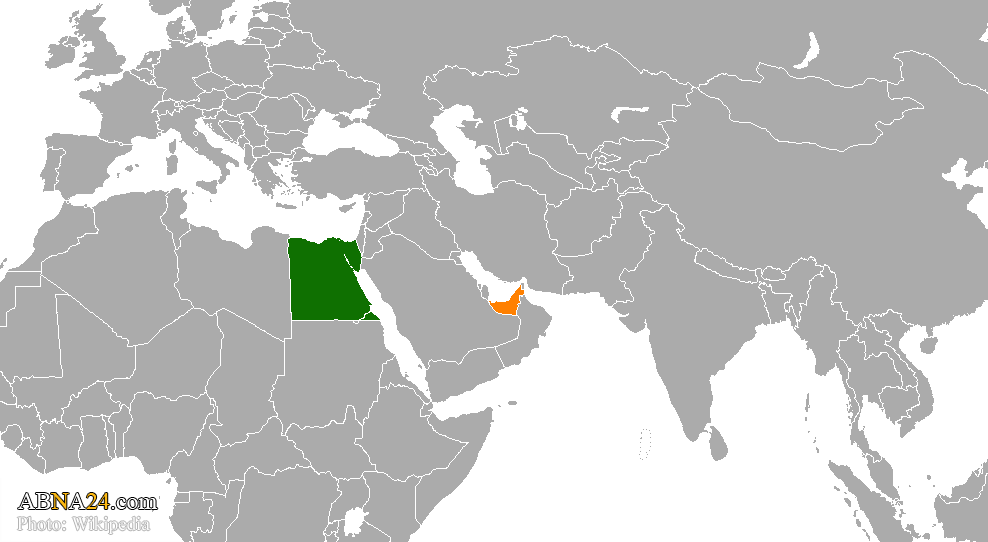AhlulBayt News Agency (ABNA): Over the past decade, ambitions of Abu Dhabi Crown Prince and the UAE de facto ruler Mohammed bin Zayed Al Nahyan to transform the Persian Gulf Arab state into a regional power and a leading nation in the Arab world have been a source of differences with most important Abu Dhabi partners and allies. One noticeable example is the performance of the UAE in the Yemeni war in which despite an initial alliance with Saudi Arabia, the country went roughly separate ways, turning into Riyadh rival.
Now the scenario repeats itself, again with one of the most important Abu Dhabi allies Cairo and its leader General Abdel Fattah el-Sisi. Al-Araby Al-Jadeed newspaper reported on Sunday about “unstated” deterioration of tensions between the UAE and Egypt. According to the report, the Emirates has scaled down its financial and nonfinancial support to Egypt, and in some regional cases has acted just in line with its own interest without considering the Egyptian interests.
Abu Dhabi, on the other hand, accused Cairo of having information about two attacks on the UAE embassy in Ethiopia and Sudan, but not informing Abu Dhabi, which, according to the newspaper, led to Abu Dhabi cutting off its financial support to the Egyptian government. However, it seems that the reasons for the tension in the relations between the two countries are more important issues, which are mostly related to Egypt's concern about the Emirati policies.
UAE support to Ethiopia
In recent years, the UAE has been trying to establish itself as an important player in the Horn of Africa, an ambitious goal that helps expand its influence in the region through political alliance, economic aid and investment, and military base and port agreements. In the summer of 2018, after a series of regular meetings among Eritrean, Ethiopian officials and Emirati officials, the two African states announced that they had reached an agreement to end their 20-year war, and a peace agreement was signed in Saudi Arabia in the presence of bin Zayed.
This approach pushed the UAE to adopt a stance conflicting to that expected by Cairo in the Egyptian-Ethiopian dispute over a dam, dubbed Grand Ethiopian Renaissance Dam, which cuts Egypt’s share from Nile River, and also Tigray war. Such a stance sent Egypt furious especially that the Emirates provided Ethiopia with weapons and logistics. Cairo is aware of the recent volume of Abu Dhabi logistical, military and intelligence assistance to Addis Ababa, especially at a time when Ethiopia was embroiled in conflict with the Tigray Regional Government. Cairo was optimistic to take advantage of the situation Ethiopia was grappling with to put pressure on Addis Ababa. But the Emirati supports marred the Egyptian plans.
Normalization and UAE rival-making for Suez Canal
The UAE agreement with the Israeli regime is another driver for el-Sisi discontentment with the UAE. Reports say that bin Zayed did not consult with the Egyptian leader and did not even inform him of the intention to sign the agreement with the Israelis. This gives the Egyptian president a reason to be angry at the so-called peace agreement. Despite his welcome of the accord, el-Sisi did not send an envoy to Washington to attend the official agreement signing event, signaling that he has no intent yet to settle differences with bin Zayed.
Moreover, Abu Dhabi and Tel Aviv mull a new channel linking Israel to the UAE. Deeming the project a strategic threat, Egypt has gone infuriated with the Emirates. Cairo is also worried about an oil pipeline between the two sides.
Libyan crisis
Although Egypt and the UAE have common interests in support to General Khalifa Haftar in the face of the Turkish influence and Muslim Brotherhood power gain in Tripoli, it seems that follows more serious priorities in the war-weary North African country. One priority could be that it wants to prevent rise of a new Sinai in eastern Libya. Despite a parliamentary authorization for direct military intervention in Libya in favor of Haftar, el-Sisi has never considered direct military involvement in the Libyan civil war. He even did not support Haftar’s last year assault on Tripoli, and even more, he warned the general, a Gadhafi regime’s holdover. After that, Egypt even established relations with the heads of the UN-backed Government of National Unity Fayz Siraj and Turkey, angering Abu Dhabi. For Egypt, the war in Libya began with a video released in 2015 by the ISIS terrorist group showing its fighters executing 20 Egyptian Christians and a Ghanaian Christian off the coast of Libya. The Egyptian army did not hesitate to respond and bombed the terrorist training camps in Libya a few hours later. Two years later, Christians were attacked again by ISIS in Egypt, with at least 28 people killed and 25 others wounded. The Egyptian army attacked Libya once again in reaction.
Actually, the Emirati concerns in Libya are mainly about the Turkish intervention and Brotherhood influence boost, while for Egypt the security of common borders with Libya is a priority.
General el-Sisi’s Egypt has concluded that it cannot trust any “big brother” and needs to have its own independent foreign policy.
/129

